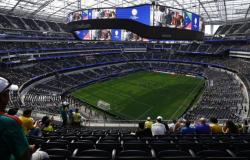RIO DE JANEIRO (AP) — When Rio de Janeiro hosted the Olympic Games in 2016, videos of the sprawling lagoon complex around the Olympic Park were everywhere. After years of being polluted by sewage and garbage, many hoped that the wave of investment linked to the international sporting event would restore its waterways. That didn’t happen.
Eight years later, a private concessionaire is working to recover the aquatic ecosystem in western Rio. The project aims to remove enough silt and dirt from the Barra and Jacarepaguá lagoons to fill 920 Olympic swimming pools. Dredging began in late April and is expected to take three years, according to Igua, the company that recently took over water and wastewater in the city’s western neighborhoods.
Real estate development in western Rio has increased significantly over the last half century. Areas of mangroves and coastal forests were filled in and paved to make way for gated communities and exclusive apartment complexes. They were required by law to treat their wastewater, but many turned off their systems at night to save money, according to Márcio Santa Rosa, who was in charge of the environmental management and sustainability plan for the 2016 Olympic bid. Local watersheds too They received untreated waste from informal working-class neighborhoods.
Before the 2016 Olympics, the Santa Rosa office committed to restoring the lagoon complex and the state government conducted extensive studies. But he got caught up in the bureaucracy, Santa Rosa said.
“There was a dispute between public prosecutors (state and federal), and the project did not move forward,” Santa Rosa, who now coordinates sustainable marine economy and bay management at Rio’s environmental secretariat, told The Associated Press for phone. “Unbelievably, we missed the opportunity to do this cleanup work during the Olympics.”
In 2021, the Rio state government separated water distribution and wastewater collection from its utility company, Cedae, and opened a bidding process for four 35-year concession areas. Winning bidders can lose their concessions for failing to meet their contractually stipulated goal of increasing wastewater collection and treatment to 90% by 2033, and have specific environmental requirements. Igua has to clean the lagoon complex.
Expectations before the grant were “the worst possible,” said Mario Moscatelli, a biologist and coastal ecosystem expert, and a longtime critic of the state’s inability to stop the flow of sewage into waterways.
“We had the Pan American Games, the Olympic Games, the World Cup, thousands of Olympic promises and environmental legacies that ended up not happening,” he noted.
But Moscatelli said he has witnessed the lagoon’s conditions improve while working for Igua as a consultant. He compared it to a patient who, once terminal, is now up and walking.
Igua must invest 2.7 billion Brazilian reais ($510 million) in its concession area, including 250 million reais to clean the lagoon complex. In addition to dredging, Igua is restoring channels between the lagoons and the Atlantic Ocean, installing collectors to prevent the discharge of untreated wastewater, and recovering native mangrove forests.
Reversing decades of degradation and lack of watershed management will still take time.
“It is a medium and long-term path. We cannot yet evaluate or verify any gains, because all these actions need to be implemented,” said Lucas Arrosti, Igua’s operational director. “Only after they are completed will we begin to see significant changes in water quality.”
___
This story was translated from English by an AP editor with the help of a generative artificial intelligence tool.






